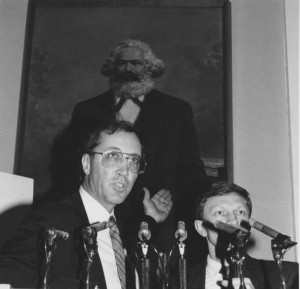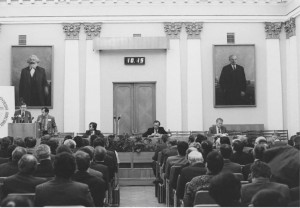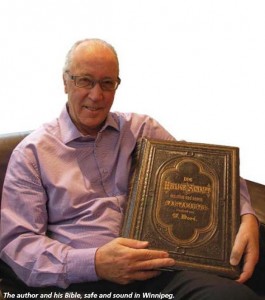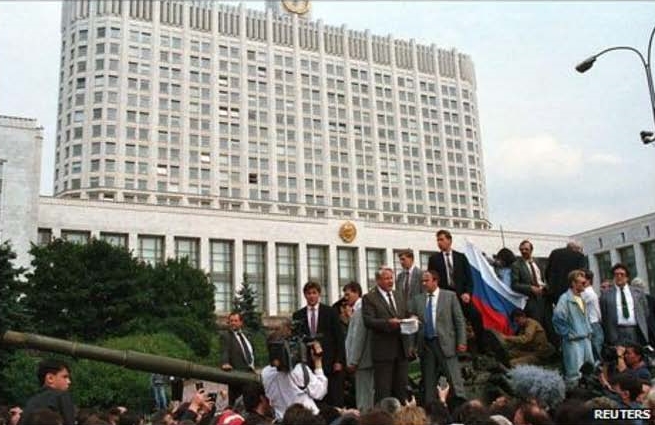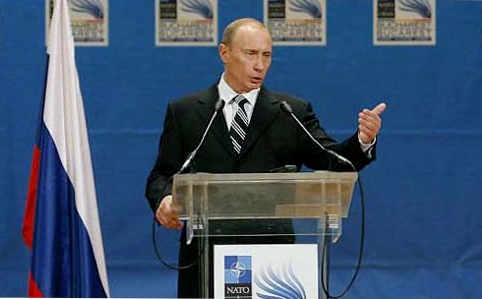Following is a blog I wrote dated November 20, 2015 titled “Is Vladimir Putin a Rational Actor?”
This was written shortly after events related to South Ossetia, Crimea and Eastern Ukraine. The essay addresses the historical context that goes back to the Foundation and strategy of the Russian Empire and then the events of the 20th Century that shaped the geography and politics of the region. Seen in that light the perspective of Putin and much of the population of Russia Is more rational If seen from that narrow point of view.
There is a quote from another of my essays of 1992 (on last page of blog) written during a period of time when I was very active inside Russia. This speaks to the future political uncertainties of the emerging Russia and virtually predicts the current outcome. I am certain that all historians and most diplomats are fully familiar with this understanding of history. Why did this knowledge not result in policies that could bridge this vision of history with the realities of a new world order? Why has the current outcome been such a surprise to the Governments of today?
Whatever the history, it does not in any way excuse the primitive warfare waged by Putin against the people of the Ukraine – but you wonder if there was an opportunity for diplomacy and balance along the way that was missed.
An additional essay from 1991 titled “A Night in the White House” may also be of interest. I participated in the events of 1991 that ended the Soviet Union. I was inside the barricades with Yeltsin and my printing press published the leaflets to call the population to the defense of Yeltsin and his counter-coup.
Original post……
Vladimir Putin has become an important personality and leader in the world but a leader who is not well understood. Most articles or exposés focus on his personality, corruption in the Soviet Union or a narrow view of geopolitical realities. Analysis of Putin is a very difficult subject but given a long personal and family history in that part of the world I thought I would give it a try. I welcome your feedback.
Is Vladimir Putin a Rational Actor?
Vladimir Putin emerged seemingly out of nowhere on the stroke of the millennium as President of a diminished and dysfunctional Russian Empire. He has been vilified for his personal style and his belligerent strategies – but is he acting responsibly and intelligently within his national, historical and personal context?
The phenomenon we refer to simply as ‘Putin’ is giving rise to books such as “The New Tsar” which in the very title speaks of our understanding of power as a combination of the person and the position. Margaret MacMillan (Paris 1919 etc) looks at the question of the role of the individual in history in her new book “History’s People” and others have dealt with history through the lens of a strong and sometimes accidental leader.
Most commentary speaks about Putin and his choices as if he lives primarily in current time and history is something for the textbooks. This essay will acknowledge that Vladimir Putin is very much a product of the present and his personal KGB history. Equally important, he is part of a historical process that goes back centuries and is absolutely critical to an understanding not only of Putin but the trajectory and psyche of Russia and its people.
In 1994 I hosted the Deputy Mayor of St. Petersburg and his colleague in my Winnipeg office. That happened to be the recently appointed Vladimir Putin. We toured my furniture plant and shared a cup of coffee. We communicated through translation – I did not realize at the time that we shared the ability to speak German. A more important reason for his visit to Canada was the negotiation to purchase the Canadian Candu nuclear technology.
I had an earlier connection to the Soviet nuclear industry. In 1989 Brian Mulroney, Prime Minister of Canada, led a delegation of 200 Canadian business leaders to the Soviet Union. I was present and active in the USSR during those years so joined the group when they arrived. I was invited to meet several officials from the Nuclear Ministry of the USSR and protested that they had made a mistake – I was in the furniture business – but they persisted. I met them and given the radical reduction in military and nuclear expenditures the Ministry was converting military factories to civilian use and wanted my assistance with a complex related to the use of wood. After reviewing the project I asked how they intended to pay for the investment. They stated that the ministry had access to many materials and they proposed barter. The first item on their list was enriched uranium and they insisted they could legally give that to me.
I tell that story because it illustrates how bizarre the USSR was at the end of its life cycle – the USSR inherited by Putin a decade later. The Soviet Union had not only lost the Cold War – it had lost its soul. My initial involvement was the organization of four National Conferences on “Business and Ethics” from a Christian perspective – some held in Communist Party buildings with Engels and Marx looking over our shoulders.
In those days we managed to ‘secretly’ print 100,000 bibles on a Communist Party press because they needed something I owned. We created
dozens of fake documents to meet Soviet requirements for visas, crossed borders without documents on many occasions, purchased an antique car from the KGB and any number of other adventures. The most infamous was when the KGB smuggled an antique blockprint Bible OUT of the USSR for me. Working within the stated rules and laws assured that nothing usefully could be done. That corrupt reality set the stage for the Russia that is today. Putin with his KGB background was simply the person to perfect a rotten system.
The story of the Bible and prior connected events is described in an article titled “How the KGB Helped Smuggle my Bible”.
We also created some investments that stood the test of time. From a purely business perspective, together with friends, we built a factory in Siberia to introduce high tech farm equipment (Air Seeder technology) designed for soil preservation in the challenging climate of Siberia and Kazakhstan. That technology is now the standard in Soviet agriculture. Another well-known initiative was LCC International University which survives and prospers to this day – initiated in Lithuania prior to its independence.
I was invited to ‘return’ to the USSR in early 1989 by a senior Soviet diplomat who stated that his country would attempt to create a market economy and fail. He stated that without entrepreneurs Russia will be dominated by large controlling companies (think oligarchs and their western equivalents) and without ethical values – referring to my Christian faith – there would be a deficit of trust.
Given my family history in the USSR my engagement had a very personal element. When Gorbachev was ousted in August of 1991 by a putsch or coup – Boris Yeltsin mounted a counter-coup. We all remember photos of Yeltsin standing on a tank in front of the Russian White House (Parliament). Leona and I participated with our Russian colleagues in those events and spent the final and decisive night of the August coup inside the barricades protecting the Yeltsin group from a possible military attack – presumably with our bodies. I did have a small direct part in those events. I had provided a printing press to a friend in Moscow – and it was used to print the pamphlets to call Muscovites to action and protect the Yeltsin counter-coup.
The detailed events of that night are described in an essay I wrote at the time titled “ A Night in the Whitehouse” and can be accessed here or through my website.
The events of 1991 led to the lost decade that articulated a void in the shape of a personality just like Putin and he arrived to fill that void – and that is the thesis in the rest of this essay.
I will start with History:
The vastness of Russia and at the same time the confinement and paranoia created by the inhospitable north, endless forests, deserts filled with independent nomads and competing empires shaped Russian politics and the Russian psyche. For centuries Russia struggled to expand to warm water and the freedom of the seas but never succeeded. The Soviet Empire only collapsed in 1991. Those distant and remote border territories had served the purpose of keeping enemies at bay. Suddenly all of the historic challengers became near neighbors. We tend to forget that the Ottoman Empire was at the gates of Vienna until the final effort in 1683. Catherine the Great succeeded in pushing the Ottoman Empire out of what we call Ukraine a full century later in the 1780’s. With that victory over the Turks she invited more advanced farmers from Western Europe to settle the captured lands as a defense against the Ottomans – my own ancestor arrived in the Central Ukraine from the Hanseatic City of Danzig as early as 1789 – a mere 5 years after the end of hostilities.
The Crimean War followed in the 1850’s with a technical defeat for Russia – but placed the former Islamic Crimea firmly under Russian control. That war resulted in Russian gains in the Transcaucasus and the same pattern followed. In this case my Mother’s family settled the nomadic plains of Cherkessia on the north side of the Caucasian mountains – again less than 10 years after the Crimean War.
One accomplishment of the 1784 Treaty (Between the Ottoman Empire and Russia) was assured access for Russian ships through the Dardenelles – we tend to forget the incredible geographic challenge faced by the inland empire of Russia. The wars continued in the Balkans until the outbreak of WWI with its start in Sarajevo – one of the flashpoints of this endless challenge.
I suspect that Europeans have a much better grasp of History – but in North America we are blissfully yet dangerously unaware of these complicated centuries of competition between a paranoid and expansionist Russia and a declining Ottoman Empire. To complicate matters the European Powers would often intervene on the side of the Islamic Ottomans against Christian Russia to keep Russia from becoming too powerful – the basic rationale behind the Crimean War. North Americans and their politicians may be unaware or unappreciative of this history – but I can assure you that the citizens of Russia and one Vladimir Putin are not.
The competition went beyond land, power and sea access. The 1784 Treaty between Russia and the Ottomans also assigned Russia the official role of “Protector of Orthodox Christians” inside the Ottoman Empire – and that was a significant proportion of its population. One cause of the Crimean War related to the protection of Holy Sites in Jerusalem. The Balkan Wars in the half-century before WWI were fought primarily in places with a significant Christian (Orthodox) population – often with the rationale that Russia was coming to their defense.
The Russian Orthodox Church is again reclaiming its historic pre-eminence inside Russia. Whatever Putin believes – giving encouragement to this religious exclusivity makes for good politics. This explains why Putin publicly asks the question why it is only Russia that has a concern for the protection of Christians in the dangerous Middle East – and uses that defense as part of the rationale for intervention in Syria.
WWII had a favorable outcome for Russia with the absorption of most of Eastern Europe. This represented the greatest territorial extent of the Russian Empire. With more advanced technology Russia could overcome its lack of access to warm water and develop a strategy of client states anywhere in the world – think Cuba. The final Soviet over-reach was Afghanistan and the beginning of the end. Unfortunately it was also the beginning of a new danger to the world when the USA chose the strategy of supporting fundamentalist Muslim militants to drive the Soviets out of Afghanistan. The direct descendants of those militants became the Taliban and with the support of a Wahhabi Saudi Arabia – supported by the USA because of oil – morphed into Al Qaeda, the Islamic State and who knows what will come next?
The other historical context grows out of the events during and after WWI, the carve-up of the Ottoman carcass into unsustainable client states and the complicating politics of oil and Israel. In the West we tend to be somewhat informed about this latter process but the history that shapes the minds and actions of the Russian people and their leader Putin is the other history about which we know too little.
The collapse of the Soviet Union and the response of the West:
The fall of the Berlin Wall in 1989 and the 1991 collapse of the Soviet Union were seen in the West as proof of the superiority of Western ideology and technology. Francis Fukuyama wrote the memorably titled essay “The End of History”. Well, History did not end! Those of us who spent significant time in the Soviet Union during these tumultuous years perceived a real opportunity to shape a different world. Unfortunately, the West responded with a triumphalism that contributed to the devastation of the the economy of the surviving Russia but also helped to destroy the dignity and self-worth of its people. Very clearly the Russian leaders contributed substantially to the negative outcomes but they were helped by a West which offered bad advice and very little meaningful support.
During the early period of privatization I was one of the people inside Russia with connections in the West and was correspondingly asked to assist in finding relationships and partners for the emerging entrepreneurs (the future oligarchs) with a promise of 5% of any deal. When too many of my opposites ended up at the bottom of the Moscow Canal and the pattern of kleptocracy became clear I decided to stick to charitable activities – plus our farm equipment project remote enough to survive most of these challenges.
While these events were taking place Vladimir Putin resigned from the KGB. He had been based in East Germany and became a bureaucrat (strategically in charge of foreign relations) within the Administration of Mayor Sobchak of St. Petersburg. His biographers do not paint him as a Napoleonic figure with a dream of power and a scheme to get there. He had a reputation for effectiveness, reputedly immune to corruption and opportunistic on occasion. (His reputation as corruption–free has since been challenged). He ended up as a rising official in the dysfunctional Government of an ill and frustrated Boris Yeltsin. It seems he was simply in the right place at the right time when he was offered the Presidency at the stroke of the millennium.
Putin recognized the opportunity, took charge and made history. We need to evaluate his actions and decisions in the light of this (over-simplified) history of Russia, the Soviet Union and the post-Soviet experience. It has been pointed out that Putin’s worst approval rating (by his citizens) is higher than the best-ever approval rating of former Canadian Prime Minister Steven Harper.
Why has Putin become such an ‘evil’ person in Western eyes?
The primary concern is the treatment of the Ukraine starting with manipulating gas prices and supplies and then followed with the takeover of the Crimea and presumed support of rebels in the eastern industrialized region of Ukraine. Russia had earlier participated in the war with Georgia which resulted in the partition of South Ossetia.
We should note that the vicious war in Chechnya launched immediately after Putin’s rise to the Presidency bothered us a lot less. Doing damage to some pesky Islamic separatists was somehow acceptable. If ancient history was one chapter then the period beginning with the fall of the Berlin Wall in 1989 is another. We all cheered as the wall fell and countries like Lithuania followed by Georgia declared their independence. We failed to note that South Ossetia responded by immediately declaring its independence from Georgia. The final breakup of the entire Soviet Union into fragments in late 1991 seemed to us like the end of Russia as a geopolitical actor and problem. Only a few people like George Soros and his Open Society Fund noticed and tried to stem the damage. He personally contributed more funds to the development of stability, good Governance and protection of the knowledge of nuclear scientists than the entire US Government.
Given a weak and putative democratic and no longer threatening Russia – what was the thinking behind the very quick extension of NATO membership to countries of Eastern Europe? The Yeltsin Government was in disarray and the borders of NATO were pushed to the Eastern fringe of Russia while it was too weak or distracted to respond. The Baltic countries could argue a separate and more European history – but the Ukraine never really existed as a country.
If you really want to understand Putin and his view on these subjects it is very useful to read his April 2, 2008 speech to the meeting of NATO in Bucharest (search NATO/Bucharest/2008/Putin). He goes into great detail about the history of the Ukraine, Crimea, Transcaucasus and the dispersal of Russian people throughout the region. The NYTimes describes Putin as combative and thoughtful.
President Bush arrived the next day and the NYTimes reports that “President Bush threw the NATO summit meeting off-script…by lobbying hard to extend membership to Ukraine and Georgia, but he failed to rally support for the move among key allies.”
A very senior NATO official recently confided in me that this speech (by Bush) seemed to send a message to Putin that he had no deal or understanding with the West on the question of being totally surrounded by NATO. Whatever the USA thinks, Ukraine and Georgia are the ‘near-abroad’ for Russia in the same way that the USA for decades has viewed all of the Americas as their ‘near-abroad’ – think Munroe Doctrine. He stated it seemed as if a switch went on in the mind of Putin and he began acting on a strategy that would assure that the extension of NATO could never happen. The South Ossetia war took place a mere 4 months later and the engagement with Ukraine seemed to harden.
Russia has a very sound rationale for claiming that Crimea should be part of a Russian state given its history, population and role as a military center. The switch from Russia to Ukraine was made one morning in 1954 when Khrushchev simply signed a paper – no discussion and no rationale. If you read speeches by Putin he objected vigorously to the NATO bombing of his (Orthodox Christian) ally Serbia which resulted in the creation of a separate nation of Kosovo. The Western argument was that Kosovo had become predominantly Muslim and therefore this seemed to justify independence. Putin points out that the great majority of Crimean residents are Russian and have been since its capture from the Ottoman Empire – so why is Crimea different than Kosovo? Indeed why?
My personal connection extends to Crimea as well. My maternal grandmother was Crimean. She was non-Slavic but some mix of many DNA strands from the Eastern Mediterranean and North Africa.
We have taken the view that somehow borders are sacrosanct regardless of facts on the ground like Crimea – and they should not be tampered with. At the same time in recent decades we have accepted Kosovo, the partition of Czechoslovakia, the separation of Eritrea and the creation of South Sudan. Cyprus is divided and Israel builds walls at its pleasure. Closer to home we could look at the history of how the border with Mexico was relocated from time to time. Panama could be added to the list. The point is that we should look at the Crimean dilemma in context and with perspective. The reality is that Russia has a strong claim to Crimea and the majority of people genuinely prefer to be part of Russia.
Eastern Ukraine is both the same and different. The totality of Ukraine is a combination of Russian territory – if population matters – in the east, Crimea as explained in the south, territory gained from the Catholic Hapsburgs after WWI in the West and a more authentic Ukrainian center. By claiming Crimea and creating havoc in the East Putin has created a de-stabilized Ukraine and in his view an assurance that it will not become a part of NATO.
We all understand the term ‘Finlandization’ as the necessary compromise to allow Finland to be itself but not a threat to its neighbor. In a world of competing powers this kind of strategy has become a necessity for many countries that border a strong or paranoid and powerful neighbor. As Canadians we understand the limits to our geopolitical imagination!
Is Putin a rationale actor?
I would argue that Putin bases his objectives and world view on a rational and overall fair understanding of the place of Russia in the universe. When we look at Western actions in the Balkans and elsewhere since 1991 we have not set a great example nor have we allowed Russia to find a place that allowed for dignity and a political role in the world.
While we wring our hands about the Ukraine – and Russian actions are very unhelpful – we forget how Western policies and actions have messed up the Middle East, a region of genuine concern to Russia. Given its significant Muslim population Russia has a legitimate concern about policies that seem to promote or result in an increasingly unstable and fanatical region. We should not be surprised that Russia has a view on matters like Syria and its Government.
If Putin’s view of his region and the world may be rational I would argue that he exhibits a genuine weakness of judgment – a weakness that he shares with George W. Bush. Both men were or are too ready to apply a violent solution with the false belief that such action could be surgical and you could withdraw back to the prior situation. If the goal was a Ukraine that was not a military threat to Russia that might well have been accomplished through more diplomatic means – assuming that the West read a little history first. Many experts acknowledge that if Crimea had been allowed a fair and contested independence referendum similar to Quebec, Scotland, South Sudan or Catalonia – quite certainly an association with Russia would have been the result. The argument is also made that Putin is afraid of a democratic and economically and socially successful Ukraine on its doorstep – as an example to the people of Russia of what might be possible with better governance.
It is not my intention to justify all of the actions or attitudes of Vladimir Putin but it is unhelpful to simply characterize his actions in defense of his idea of Russia as ‘evil’. He is a product of KGB training and clearly operates by values and principles that many of us find problematic. At the same time he is President (or totalitarian leader) of a country that has no democratic history and with a much greater tolerance or acceptance of an authoritarian leader – especially a leader that appears to restore their place in the world. We need to remember that he is the President of the people of Russia and not of Europe or the world. The USA Government, by claiming ultimate military superiority and the self-proclaimed authority to act independently of UN or other international sanctions carries with it a greater responsibility. Putin can be criticized for permitting the existence of the oligarchs – at the same time inequality in the USA has reached levels only seen in the 1920’s.
I recently visited the USA Embassy in Tbilisi Georgia, a country of 4,000,000. The Embassy is a highly protected fortress with a staff of 800 compared to a single honorary consul for Canada. The stated objective of the embassy is “to prevent further encroachment of Russian influence”. Lets imagine a massive Russian or Chinese Embassy in Mexico City with the stated objective of minimizing USA influence in Mexico? I simply suggest we need some perspective.
I do not claim the gift of prophecy but the following paragraph is from my 12th and final trip report written in March 1992. Many of the issues of today were substantially predictable from the perspective of a dying Soviet Union. Western politicians could have done better in their anticipation of events and issues.
Following paragraph a direct quote:
“There is no precedent for the disintegration of an empire covering 1/6 of the globe with 100 nationalities and 30,000 nuclear weapons. The absence of civil war is itself an achievement. There are any number of potential local wars but a realistic appraisal limits the danger to the Southern Caucasus with some flash points on the northern slopes plus Moldavia and some Asian Republics. The Baltics may have problems but probably not of a military nature.
The most damaging conflict could arise from the inability to resolve the complications caused by the Ukraine’s search for identity. The absence of an independent history creates problems when the Ukraine attempts to reinforce its identity by assertive action. The Crimea will undoubtedly resist rule from Kiev regardless of Yeltsin’s or Kravchuk’s policies…..If the Crimea is successful in its challenge, problems in Eastern Ukraine will not be far behind. Russia will have some severe problems such as the Chechen-Ingush region….”
How to deal with Putin Now?
First, we need to understand that his primary role is to represent the interests of the Russian people. Second it would be useful to get up on our history of Russia and the region – plus the history of the complicated Middle East which requires another very long essay. It is also useful to read his speeches. He defends Russian interests with vigor but also more thoughtfully than the speeches of his counterpart George Bush through 2008.
Putin has the ability to make decisions with less restraint than the leaders of most or all Western nations. This does not automatically assume that he will make bad decisions but allows for the fact that he can make a deal and choose to keep it where Western leaders are often more constrained in their actions. It is predictable that he will use this freedom of action to play a more decisive role in Syria –a problem that has incapacitated the West.
We began using the rhetoric of a unipolar world in 1991 but have failed to look at the reality. The US undoubtedly has military superiority but is discovering that military power alone does not assure desired outcomes. We are now observing an assertive China, a recalcitrant North Korea, Iran has the ability to project regional instability, Israel projects intransigence, African poverty and tribalism defy solution and so on. Russia under Putin has restored its ability to project its influence in its near-abroad and sometimes beyond and we all act very surprised that it has a point of view.
The point is that we need to start with the assumptions that the interests and objectives of Russia need to be understood in the light of their perspectives and at least have their validity considered. Whether or not we agree with the actions of Putin, his actions are largely rational from the perspective of a diminished and humiliated Russian Empire.
Note: My website artdefehr.com contains a number of articles and reports about the Soviet Union at the time of its breakup. Simply click here USSR, or go to the website, then select International Experiences/USSR. There are articles like “Field Notes from a Revolution” – which is a series of 10 reports covering 12 trips between August 1989 and March 1992. There are additional stories and topical writings.


